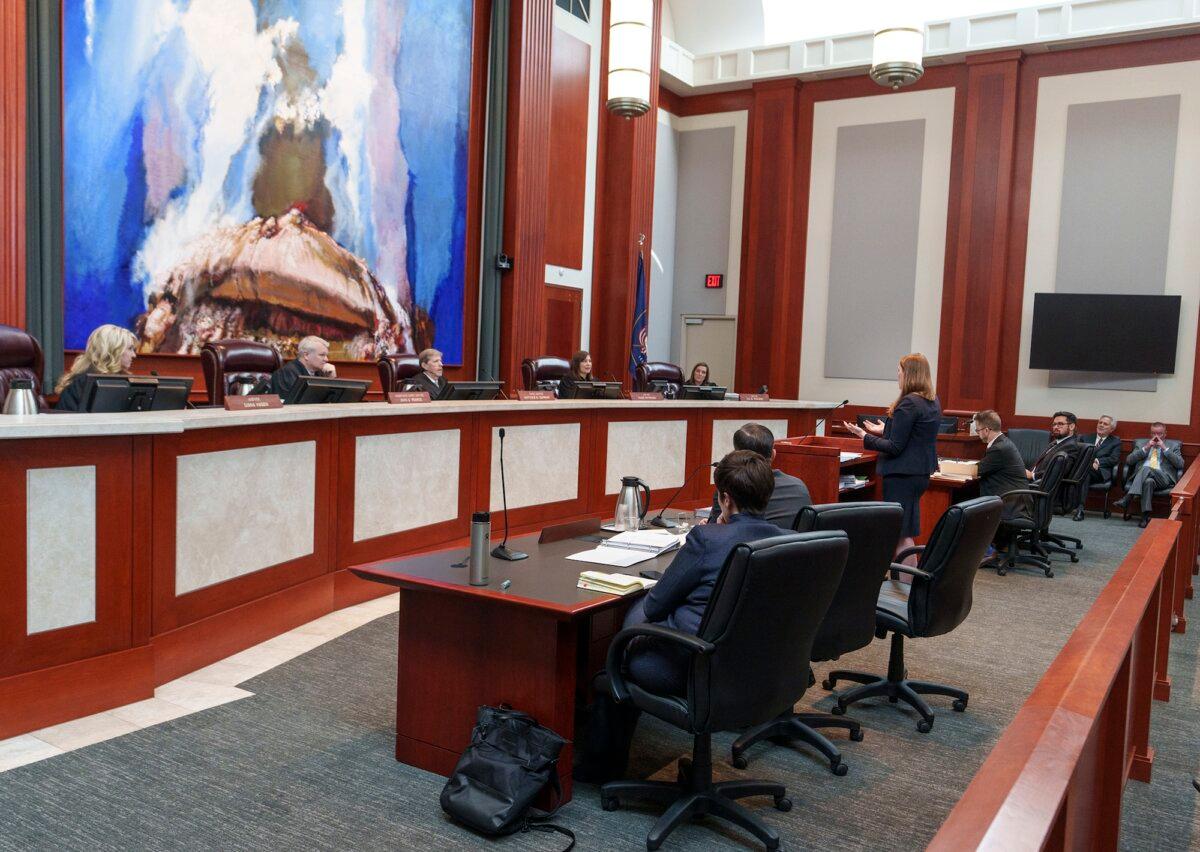Proponents praised the ruling, calling it a win for democracy and against ‘partisan gerrymandering.’
The Utah Supreme Court has ruled that the state Legislature overstepped its authority when it changed a ballot initiative that set up an independent redistricting commission and instead drew up its own political maps, which plaintiffs argued went against the voters’ will.
Five Utah Supreme Court justices ruled unanimously on July 11 that the contested map that was approved by the state’s GOP-led Legislature stripped power from the commission, which was tasked to ensure that congressional boundaries were drawn in a way that didn’t favor any particular political party.
“We hold that when Utahns exercise their right to reform the government through a citizen initiative, their exercise of these rights is protected from government infringement,” Justice Paige Petersen wrote in the opinion. “This means that government-reform initiatives are constitutionally protected from unfettered legislative amendment, repeal, or replacement.”
The state Supreme Court ordered the case sent back to a lower court to revisit the process for redrawing the state’s congressional boundaries in a way that’s consistent with the high court’s opinion in the matter.
“Although the Legislature has authority to amend or repeal statutes, it is well settled that legislative action cannot unduly infringe or restrain the exercise of constitutional rights,” the justices wrote.
Legislative leaders criticized the decision, alleging that the ruling establishes “supreme laws” that strip legislators of lawmaking power.
Utah Gov. Spencer Cox said he disagrees with some of the high court’s determinations but respects its role in the state’s system of governance.
An attorney for the plaintiffs and the director of a group behind the ballot initiative both praised the ruling, calling it a win for democracy and against “partisan gerrymandering.”
More Details
In its opinion, the high court clarified in the opinion that when Utah citizens use an initiative to reform the government, this action limits the Legislature’s authority to alter or repeal that initiative. However, this doesn’t mean the Legislature is entirely barred from making changes. Legislative amendments that support or facilitate the reform, or at least do not undermine it, are permissible.
“Legislative changes that do impair the reforms enacted by the people could also survive a constitutional challenge, if the Legislature shows that they were narrowly tailored to advance a compelling government interest,” the justices wrote in the opinion.

SB200 removed Proposition 4’s requirement that the Legislature explain its map-drawing decisions and removed the partisan gerrymandering ban.
The Utah Supreme Court wrote in its opinion that SB200 can stand up to legal scrutiny if attorneys for the Legislature can show there was a compelling reason to pass it and that it was not overbroad.
Justice Petersen wrote in the opinion that if attorneys for the Legislature cannot establish this then “the act enacted by Proposition 4 would become controlling law.”
Utah House Speaker Mike Schultz and Senate President Stuart Adams issued a joint statement expressing strong disagreement with the ruling, saying it injects chaos into the lawmaking process.
“This is one of the worst outcomes we’ve ever seen from the Utah Supreme Court,” they said in the statement. “Rather than reaching the self-evident answer, today the Court punted and made a new law about the initiative power, creating chaos and striking at the very heart of our republic.”
The two legislative leaders said the court’s ruling could negatively impact Utah’s future by empowering big money and outside interest groups.
“It mirrors how states like California are governed—by big money and outside interest groups that run initiatives to alter the government and push their own agendas,” they wrote, alleging that the ruling creates “supreme laws” that lead to lengthy legal disputes, stripping state, county, and municipal authorities of policymaking power.
“While I disagree with some of the Court’s analysis and determinations, I respect the role of the Court in our system of government,” he stated. “Ultimately, what matters is that we craft policy that keeps Utah the #1 state in the nation to work, live, and raise a family. We look forward to continuing Utah’s pattern of careful and deliberate policymaking with the best interests of Utahns as the top priority.”
“The people of Utah voted in 2018 for more transparency and accountability from our state government and today the Utah Supreme Court affirmed it,“ Katie Wright said in the statement. ”We look forward to the day when Utah voters can finally pick their own politicians, not the other way around.”
Mark Gaber, one of the attorneys at the Campaign Legal Center representing the plaintiffs, called the ruling a win for opponents of “partisan gerrymandering.”
In their joint statement, the Utah House speaker and Senate president expressed confidence that the lower court review of the matter will ultimately side with the Legislature in the case.










